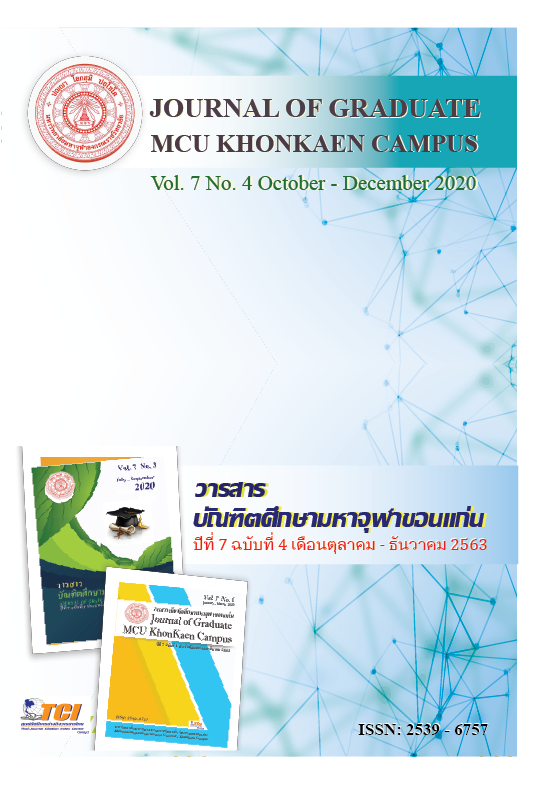พุทธจริยศาสตร์กับการปฏิบัติการพยาบาลบำบัดความเครียด แก่มารดาบิดาผู้ป่วยเด็กระยะวิกฤต
Main Article Content
บทคัดย่อ
การเจ็บป่วยระยะวิกฤตของเด็กเป็นสถานการณ์ที่คุกคามต่อชีวิต ทำให้มารดาบิดามีความเครียด ซึ่งต้องการความช่วยเหลือจากพยาบาล การนำหลักพุทธจริยศาสตร์ มาประยุกต์ในการปฏิบัติการพยาบาลเพื่อบำบัดความเครียด จะช่วยบรรเทาความเครียดและคลายความทุกข์ให้กับมารดาบิดาได้ บทความนี้มีวัตถุประสงค์เพื่อศึกษา แนวคิดและทฤษฎีความเครียดในทางวิทยาศาสตร์สุขภาพและในทางพระพุทธศาสนา การปฏิบัติการพยาบาลบำบัดความเครียดแก่มารดาบิดาผู้ป่วยเด็กระยะวิกฤต และการประยุกต์ใช้พุทธจริยศาสตร์ในการปฏิบัติการพยาบาลบำบัดความเครียดแก่มารดาบิดาผู้ป่วยเด็กระยะวิกฤติ การศึกษาพบว่า พระพุทธศาสนากล่าวถึงความเครียด ว่าคือ ความทุกข์ ส่วนการปฏิบัติการพยาบาลเพื่อบำบัดความเครียดแก่มารดาบิดาผู้ป่วยเด็กระยะวิกฤตนั้น พยาบาลต้องนำกระบวนการพยาบาลมาใช้ในการส่งเสริมและสนับสนุน ให้มารดาบิดาผู้ป่วยเด็กระยะวิกฤตมีการจัดการกับความเครียดอย่างเหมาะสม ครอบคลุมและสอดคล้องกับปัญหาความต้องการและระดับความเครียดของมารดาบิดาแต่ละบุคคล หลักพุทธจริยศาสตร์ที่พยาบาลควรนำมาประยุกต์กับศาสตร์ทางการพยาบาล ในการปฏิบัติการพยาบาลบำบัดความเครียดแก่มารดาบิดาที่ผู้ป่วยเด็กระยะวิกฤต ได้แก่ หลักอริยสัจ 4 หลักพรหมวิหาร 4 และหลักไตรลักษณ์ จะเห็นได้ว่า การประยุกต์พุทธจริยศาสตร์มาใช้ในการปฏิบัติการพยาบาล เป็นวิธีการที่ดีและเหมาะสมกับบริบทการบริการพยาบาลในยุคปัจจุบัน ทำให้บริการพยาบาลเกิดประสิทธิภาพมากยิ่งขึ้น
Article Details
เอกสารอ้างอิง
กรมสุขภาพจิต. (2542). คู่มือคลายเครียดด้วยตนเอง. กรุงเทพมหานคร : ส. ป. ป. พิมพ์.
พระครูสุวิธานพัฒนบัณฑิต. (2558). การพัฒนารูปแบบการดูแลสุขภาพองค์รวมของพระสงฆ์ในจังหวัดขอนแก่น โดยเน้นการมีส่วนร่วมของเครือข่าย. สำนักงานป้องกันควบคุมโรคที่ 6 จังหวัดขอนแก่น, 22(2), 117-129.
พรพรรณ ศรีโสภา และ ธนวรรณ อาษารัฐ. (2560). บทบาทพยาบาลในการป้องกันและจัดการความเครียด.
บูรพาเวชสาร, 4(2), 79-92.
พระพรหมคุณาภรณ์ (ป. อ. ปยุตฺโต). (2551). พจนานุกรมพุทธศาสตร์ ฉบับประมวลธรรม. (พิมพ์ครั้งที่ 12). กรุงเทพมหานคร : สำนักพิมพ์ สหธรรมิก.
พระพรหมคุณาภรณ์ (ป. อ. ปยุตฺโต). (2551). พจนานุกรมศัพท์พระพุทธศาสนา. กรุงเทพมหานคร : บริษัท ธรรมภาบันลือธรรม จำกัด
พระพรหมคุณาภรณ์ (ป. อ. ปยุตฺโต). (2552). การแพทย์แผนปัจจุบันในพระพุทธศาสนา. กรุงเทพมหานคร: บริษัท สหธรรมมิก จำกัด .
พระพรหมคุณาภรณ์ (ป. อ. ปยุตฺโต). (2554). ลักษณะสามประการ ฉบับที่ 12 กรุงเทพมหานคร : พุทธศาสนาแห่งธรรมภาพ.
พระพรหมคุณาภรณ์ (ป. อ. ปยุตฺโต). (2557). การแพทย์วิถีพุทธ. กรุงเทพมหานคร : สำนักพิมพ์เคลไทย.
Aldridge, M.D. (2005). Decreased parental stress in the pediatric intensive care unit. Critical Care Nurse, 25(6), 40.
Boyd MA. (2012). Psychiatric Nursing : Contemporary Practice. (5th ed.). China : Lippincott and Wilkins.
Selye, H. (1978). The Stress of Life. New York: McGraw-Hill.
Smith, A.B., Hefley, G.C., Anand, K.J. (2007). Parent bed spaces in the PICU: Effect on parental stress. Pediatric Nursing. 33(3), 215-221.

